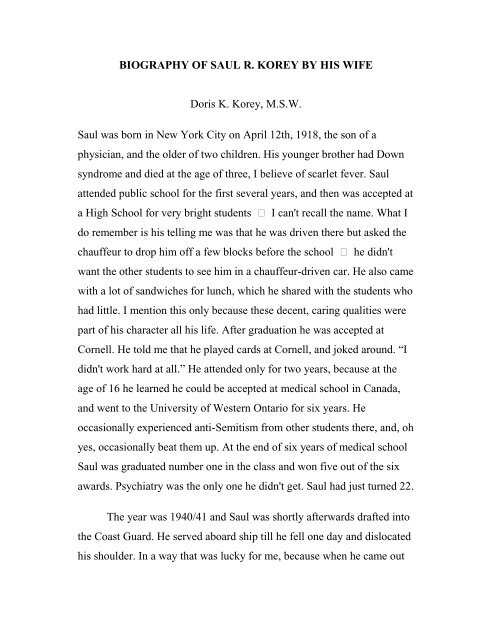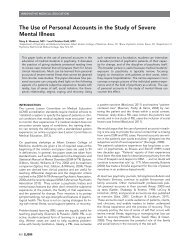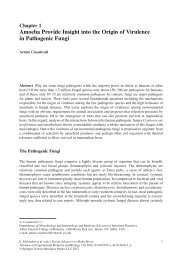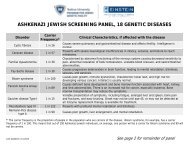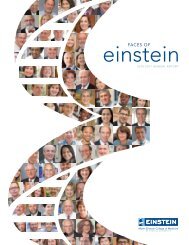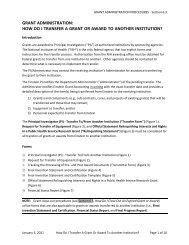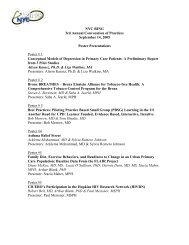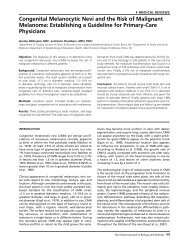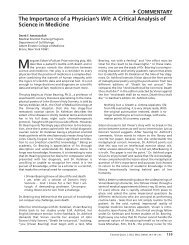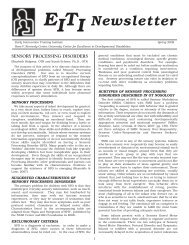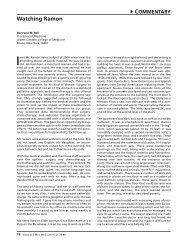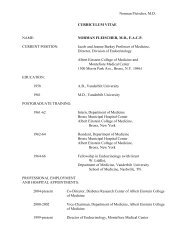Doris Korey - Albert Einstein College of Medicine
Doris Korey - Albert Einstein College of Medicine
Doris Korey - Albert Einstein College of Medicine
Create successful ePaper yourself
Turn your PDF publications into a flip-book with our unique Google optimized e-Paper software.
BIOGRAPHY OF SAUL R. KOREY BY HIS WIFE<br />
<strong>Doris</strong> K. <strong>Korey</strong>, M.S.W.<br />
Saul was born in New York City on April 12th, 1918, the son <strong>of</strong> a<br />
physician, and the older <strong>of</strong> two children. His younger brother had Down<br />
syndrome and died at the age <strong>of</strong> three, I believe <strong>of</strong> scarlet fever. Saul<br />
attended public school for the first several years, and then was accepted at<br />
a High School for very bright students I can't recall the name. What I<br />
do remember is his telling me was that he was driven there but asked the<br />
chauffeur to drop him <strong>of</strong>f a few blocks before the school he didn't<br />
want the other students to see him in a chauffeur-driven car. He also came<br />
with a lot <strong>of</strong> sandwiches for lunch, which he shared with the students who<br />
had little. I mention this only because these decent, caring qualities were<br />
part <strong>of</strong> his character all his life. After graduation he was accepted at<br />
Cornell. He told me that he played cards at Cornell, and joked around. “I<br />
didn't work hard at all.” He attended only for two years, because at the<br />
age <strong>of</strong> 16 he learned he could be accepted at medical school in Canada,<br />
and went to the University <strong>of</strong> Western Ontario for six years. He<br />
occasionally experienced anti-Semitism from other students there, and, oh<br />
yes, occasionally beat them up. At the end <strong>of</strong> six years <strong>of</strong> medical school<br />
Saul was graduated number one in the class and won five out <strong>of</strong> the six<br />
awards. Psychiatry was the only one he didn't get. Saul had just turned 22.<br />
The year was 1940/41 and Saul was shortly afterwards drafted into<br />
the Coast Guard. He served aboard ship till he fell one day and dislocated<br />
his shoulder. In a way that was lucky for me, because when he came out
<strong>of</strong> the hospital I met him. We were married in 1944, and Saul was<br />
assigned to the Marine Hospital in New Orleans.<br />
In 1945, when he was discharged from the Service at the end <strong>of</strong> the<br />
war, Saul was accepted at The Neurological Institute (NI) <strong>of</strong> Columbia<br />
Presbyterian, where he became Chief Resident. When he left NI he spent<br />
a couple <strong>of</strong> years studying I believe with Dr. Ochoa at NYU and Dr.<br />
David Nachmansohn back at Columbia. Then on to Western Reserve in<br />
Cleveland in 1955, until Dr Irving London called Saul to come to New<br />
York to help set up the <strong>Einstein</strong> <strong>College</strong> <strong>of</strong> <strong>Medicine</strong>, particularly the<br />
Division <strong>of</strong> Neurology, which in three years became a Department in its<br />
own right.<br />
Please understand in every way that Saul was a great man. I<br />
remember he said to me when he was in the hospital dying <strong>of</strong> pancreatic<br />
cancer, that he hoped his work would be remembered. A little later, lying<br />
in bed in the hospital, he said “I'm wrong, it's my family that is most<br />
important to me.” Yes indeed, Saul was a great husband, a wonderful<br />
father, a precious soul.<br />
He died at the age <strong>of</strong> 45, on September 27, 1963.<br />
March 1, 2007


